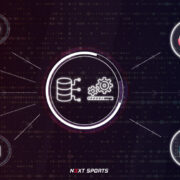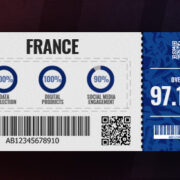By Mounir Zok

It’s a rare thing that we begin a new year on the back of a truly global showpiece. The men’s FIFA World Cup brought the curtain down on a year of sporting excellence on the field of play and achieved new milestones for innovation off the pitch, too – the foundations for football and its industry peers to build on.
While Argentina triumphed over France to be crowned world champions, some of you will also have seen via our N3XT Sports channels that – off the field – the French Football Federation (FFF) is rated as the most digitally mature among the 32 member associations (MA) that participated at Qatar 2022, as per our latest World Cup Data Report 2022.
Although an unofficial title, based on proprietary N3XT Sport analysis, it does provide a benchmark for the rest of the field in 2023. It also offers a timely reminder for how digital transformation is shaping sport at every level, and opportunities for federations and rights holders alike to innovate, inside and outside of football, during the coming years.
In order to look ahead prospectively, it’s vital that we examine the road traveled. We have witnessed several trends in 2022. In particular, we have seen rights holders shift their focus to: (1) digital infrastructure that serves the management of their own customer data; (2) major events and the opportunity they present for connecting fans with new digital products; and (3) a holistic, outcome-driven approach to their digitalization efforts.
Whereas, in 2022, we welcomed the return of fans to full-capacity stadia, en masse, 2023 will bring about new opportunities, and indeed fresh challenges, for sustaining sport’s recovery on the back of Covid-19. The global population faces projections for an economic downturn. In the meantime, sports properties will have to be mindful of the impact on their fan base, partners, and employees, including the role they can play in sustaining a bright commercial outlook (as digitally creative entities) for their entire stakeholder ecosystem.
DATA TRANSFORMATION WILL PLAY A KEY ROLE IN 2023
We’re often tasked at N3XT Sports with navigating our clients’ digital transformation journeys. As we continue to support the industry’s digitalization, within our role, we also educate the sector on the importance of data transformation and data governance for optimizing internal and operational processes, consolidating one’s own digital acumen, and retaining customer loyalty and fan engagement.
As a result, we’re seeing sections of the industry begin to hone their first-party data-collection capabilities in-house. However, it’s important to bear in mind: customer data acquisition is only as useful as the organization’s ability to turn customer data into business value – therefore, it’s vital to know how to use data as well as how to collect it.
In some cases, business value is equated solely to on-field performance, fan engagement, and customer monetization. Nevertheless, without a flexible and scalable digital framework in place, data silos remain a constant nuisance and not only impact a rights holder’s operational efficacy, but its ability to enhance the fan experience, too.
By way of example, United World Wrestling (UWW) recognized its need to invest in its data-collection capabilities, and appointed N3XT Sports to launch its first-ever dedicated mobile app, video-streaming hub, and customer relationship management (CRM) tool. This demonstrated a dramatic uptake in fan engagement during the 2022 UWW World Championships, highlighted in our latest client case study. Check it out HERE.
MAJOR EVENTS SPRINGBOARD FOR AUGMENTED FAN EXPERIENCES
It would be remiss to take forward learnings from 2022 and not to mention the launch of FIFA+ in April. The global football body’s dedicated over-the-top (OTT) streaming platform provides subscribers with access to live football matches, as well as news, interactive games, and on-demand FIFA+ Originals content featuring some of the biggest names in world football. In a similar vein, we saw the International Olympic Committee (IOC) launch new fan activations during the Beijing 2022 Olympic Games, including new mobile-supported and virtual-reality experiences.
It may sound obvious, but do not underestimate the opportunity to launch new digital products during the build-up to major sporting events, both as a marketing opportunity and also to accelerate the digital transformation process. The competition cycle provides the grounding for building an organization’s sponsorship portfolio and establishing media rights partnerships, but also flags distinct milestones for digital transformation and unique product development.
As rights holders continue to take ownership of their customer data, expect to see others expand their direct-to-consumer (D2C) offerings via their owned mobile and OTT platforms. Despite the economic downturn predicted in 2023, investment in technology is set to continue, particularly among well-established properties that own a robust data lake. With this in mind, sport can be an enabler for innovation – both as a reliable platform for the organization’s technology partners, but also as a tool for building the rights holder’s own value-proposition.
Furthermore, by building in new digital solutions that bring people closer to the sport and sponsors closer to the fans, major events provide a springboard for augmenting the fan experience via new digital touchpoints and consolidating the entity’s ability to collect and extract user data via a centralized “single source of truth”. This presents an appealing business proposition when it comes to renewing the property’s commercial rights deals and helps to add value to the brands and services that it chooses to partner with, in the longer term.
RIGHTS HOLDERS TAKING A HOLISTIC APPROACH TO DIGITAL STRATEGY
Among the barriers for exploring digital transformation inside a sports organization, there is often a misperception of the benefits it will offer the entity, especially for those used to running their business in a particular way in an increasingly digitized world. This might include a lack of confidence in what their first step should be, and – perhaps more pertinently – concerns over how soon they are going to see a return on their investment.
These are complex questions. We’ve already acknowledged that digital transformation must enable the rights holder to scale its operations and act as a pillar for sustainable growth. However, it must also give an organization and its decision-makers space to assess its current state of play, and address areas of the business where operations can be improved.
By taking this first, simple step, a thorough digital assessment does not only present a clear picture for how the organization is running and where data silos might be limiting its ability to scale, but also offers an opportunity to devise several different courses of action. This might be as simple – in the first instance – as identifying quick and easy changes for reducing operational costs, before delving into the types of digital solution and business applications needed for optimizing CRM and operational performance thereafter.
Our role at N3XT Sports is also to bring people along their organization’s digital transformation journey and to provide them with effective project- and change-management solutions that will raise the digital literacy of the existing workforce. We’re seeing sports properties taking a more tactile and holistic approach to their digital transformation, which is an intelligent move considering the importance of operational efficacy and employee performance for enhancing the customer experience and partner satisfaction during challenging times.
WHAT’S N3XT?
Digital transformation – though by definition focuses on granular changes to an organization’s digital framework – serves a much simpler goal: improving the sporting experience. By enabling the rights holder to manage its own fan and operational data, the digital transformation process helps organizations to:
- cut costs by increasing employee efficiency, to automate processes, and promote internal collaboration through data sharing that grants employees with the tools and insights to optimize processes;
- increase revenues via new digital marketing platforms, by increasing their knowledge about the customer, and advocating real-time analysis of customer behavior via their dedicated sales channels.
It’s here where the rights holder can optimize its business value and cement long-term customer and investor relationships. By understanding the areas of your organization where digital solutions can improve business performance, and the role data governance plays within your digital transformation, the rights holder puts itself in a position to drive value – both as a premium entertainment provider, and a trusted corporate partner.
We’re here to serve the industry’s digital transformation from the first conversation through to the delivery, integration, and management of technologies across the rights-holder ecosystem. We encourage you to take your own approach to this process, and to draw on benchmarks in the industry as a guide for your own digital transformation, not as the rule. We’re here to support you on this journey. Good luck to you for the year ahead. It’s primed to be another great year for sporting innovation.



